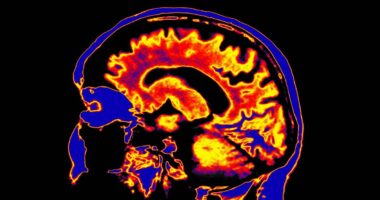Share this @internewscast.com
Two new but exceptionally rare Covid-19 vaccine side effects – a neurological disorder and inflammation of the spinal cord – have been detected by researchers in the largest vaccine safety study to date.
The study of more than 99 million people from Australia, Argentina, Canada, Denmark, Finland, France, New Zealand and Scotland also confirmed how rare known vaccine complications are, with researchers confirming that the benefits of Covid-19 vaccines still “vastly outweigh the risks”.
Researchers working as part of the Global Vaccine Data Network used deidentified electronic healthcare data to compare the rates of 13 brain, blood and heart conditions in people after they received the Pfizer, Moderna or AstraZeneca vaccine with the rate that would be expected of those conditions in the population before the pandemic.
The study confirmed with a high level of accuracy known links between mRNA (Pfizer and Moderna) vaccines and the rare side-effects of myocarditis (inflammation of the heart muscle) and pericarditis (swelling of the thin sac covering the heart). It also confirmed Guillain-Barré syndrome (where the immune system attacks the nerves) and cerebral venous sinus thrombosis (a type of blood clot in the brain) as rare side effects linked to the AstraZeneca vaccine.
But a new rare side-effect, acute disseminated encephalomyelitis – an inflammation and swelling in the brain and spinal cord – was also identified in the data analysis as being linked to the AstraZeneca vaccine.
The findings were published in the international journal Vaccine on Friday.
Prof Jim Buttery, co-director of the Global Vaccine Data Network, said the finding prompted researchers to independently confirm the side-effect by completing a second study, this time analysing a separate dataset of 6.8 million Australians who received the AstraZeneca vaccine.
Not only did the Australian study confirm acute disseminated encephalomyelitis as a rare side-effect, but the large amount of AstraZeneca-specific data also allowed them to detect a second new rare side-effect, known as transverse myelitis, or spinal cord inflammation.
Also published in Vaccine on Friday, the Australian study found the data translated to an extremely small risk of acute disseminated encephalomyelitis of 0.78 cases for every million doses, and 1.82 cases per million doses for transverse myelitis.
Buttery, who is also a senior research analyst with the Murdoch Children’s Research Institute in Australia, said; “for rare side effects, we don’t learn about them until the vaccine has been used in millions of people”.
“No clinical trial can ever have the size to answer those questions and so we only find out those questions after a vaccine has been introduced.”
after newsletter promotion
Buttery said the risk of myocarditis, is even higher with natural Covid infection than it is following vaccination.
Both conditions are serious but patients usually recover from them, he said.
Prof Julie Leask, a vaccine expert at the University of Sydney, said it’s important to keep these findings in perspective and that a Covid infection increases the risk of some of these rare conditions “much more than a vaccine” does.
She said the studies also confirmed that “our vaccine experts are paying attention to when vaccines lead to serious side-effects, and they’re acting on it”.
“Being confident in a system that will detect problems and address them, is a very important part of a robust vaccination program.”













